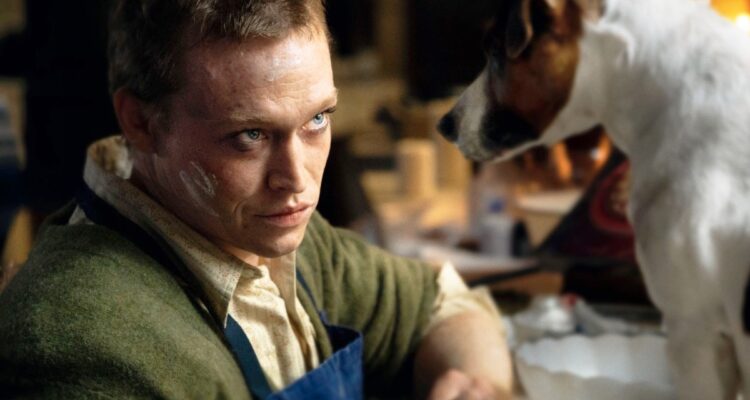For a few beautiful years in the early 2000s, Michael Pitt’s spine-chilling blue eyes wreaked havoc in world cinema, from Bernardo Bertolucci’s “The Dreamers” to Michael Haneke’s “Funny Games.” Then, due to quite a few controversies, the actor stepped away from the limelight, taking on smaller projects here and there and leaving an abyssal gap in the industry: a blue-eyed menace whose presence in any given film immediately signaled some form of psychological torture.
Many have tried their hand at filling this gap, from the sprawling Skarsgårds to Dane DeHaan, but no one has come as close to it as Caleb Landry Jones. The American actor first rose to prominence as a teen on 2011’s “X Men: First Class” but quickly took a liking for smaller, independent films, going on to work with established indie directors such as Xavier Dolan on 2013’s “Tom at the Farm” and Jordan Peele on the multi-Oscar-nominated “Get Out” (2017).
Venice Film Festival 2023: The 17 Most Anticipated Movies To Watch
Jones’ potential for the eerie reached an apex in 2021 with Justin Kurzel’s “Nitram,” a psychological thriller loosely based on the life of Australian mass murderer Martin Bryant. The actor delivered a blood-churning performance as an intellectually disabled arsonist whose history of violent impulses and isolation led him to unthinkable cruelty, which brings us nicely to Luc Besson’s “Dogman,” a twisted fable about an affection-starved boy who developed an extreme bond with dogs due to unthinkable levels of neglect.
Besson’s latest opens up with a quote by Lamartine: “Wherever there is an unfortunate, God sends a dog,” and, boy, is Douglas (Jones) unfortunate. Born to an abusive father (Clemens Schick) whose existence consists of fighting starved dogs and terrorizing his two children, Douglas develops a skewed perception of love at a young age. If he can’t find tenderness at home, he’ll find it at the kennel. And by kennel, I mean literally, as the boy is caged by his father after bluntly telling his family he loved dogs more than his own blood (and who in sane mind would blame the poor kid.)
Douglas tells his story to the audience at the same time he relays it to Evelyn (Jojo T. Gibbs), a criminal psychiatrist enlisted to assess the puzzling man after he is arrested in the middle of the night in full Marilyn Monroe drag and with a crate filled to the brim with suspiciously well-behaved dogs. The police can’t seem to figure out what to do with old Douglas, and, as it turns out, neither can Besson.
An incoherent horror fable, “Dogman” is sometimes a crime thriller and, at others, a saccharine melodrama. Juiced to the pulp in a blender of half-baked references, the film plays as a bizarre marriage between “Silence of the Lambs” and “Dr. Dolittle” while lacking the tense refinement of the former and the uncompromising silliness of the latter. Just when one thought poor Douglas had suffered enough, in comes Besson’s merciless hand, throwing in a little bit more humiliation, a little more suffering. After the cage comes a wheelchair, and then many more hurdles, from a love affair that never was to a career that never was to a depressing tour of the bowels of New Jersey as one business owner after the other crumples Douglas’ CV in a physical act of rejection.
Without an understanding of the story it wants to tell, “Dogman” becomes painfully reliant on the freakishness of its protagonist, paying a disservice to the character by reducing Douglas to a mishmash of misfortunes. The rare glimpses of joy are coupled with a bitter hint of mockery. When Douglas rolls his wheelchair into a drag club, the owner is direct: “No one wants to pay to see a crossdresser in a wheelchair,” he spits bluntly yet not bitterly. It’s a business, after all. Douglas then risks his fragile health to stand up onstage to perform a poignant rendition of Edith Piaf, the fervorous claps of the audience serving as the soundtrack to his pained physical crumbling.
Still, no performance is good enough to sustain the ramshackle foundations of “Dogman,” a circus-like spectacle at times so awfully bleak it is mesmerizing to watch. Jones, a competent but often overlooked performer, can’t mask a lack of emotional depth with cartoonish flamboyance and, even in his moments of manic hyperbole, still plays second fiddle to the true stars of an otherwise starless film: the dogs, of course. Terriers, bulldogs, rottweilers, shepherds… We got them all, folks, and how great they are.
Trained to precision and cute to the bone, the four-legged cast serves as a much-needed distraction from the trainwreck labeled by many as Besson’s return to the limelight. If this is all he’s got, then I guess the director will deservedly remain in the murky limbo of mediocrity. Woof. [D]
Follow along with all our coverage of the 2023 Venice Film Festival.

